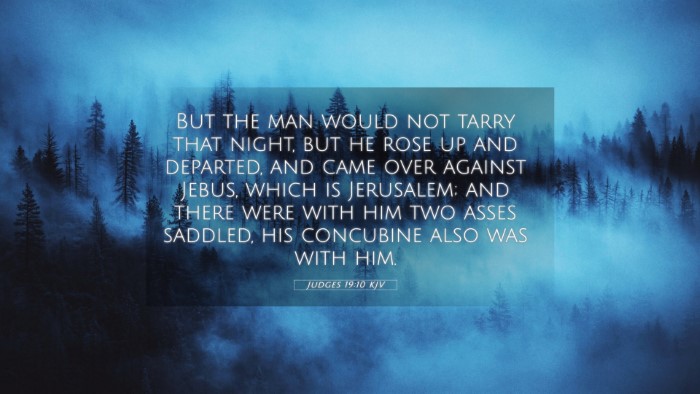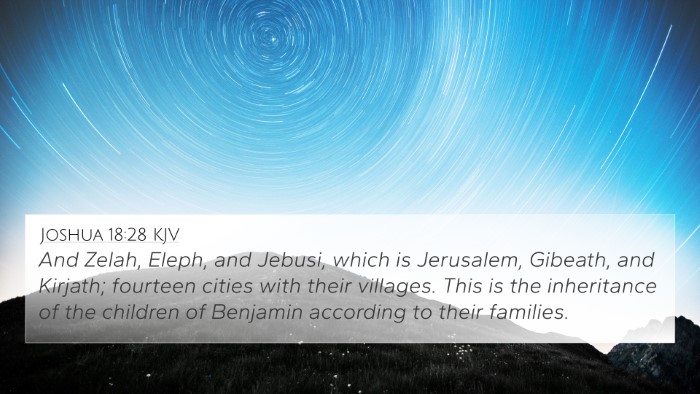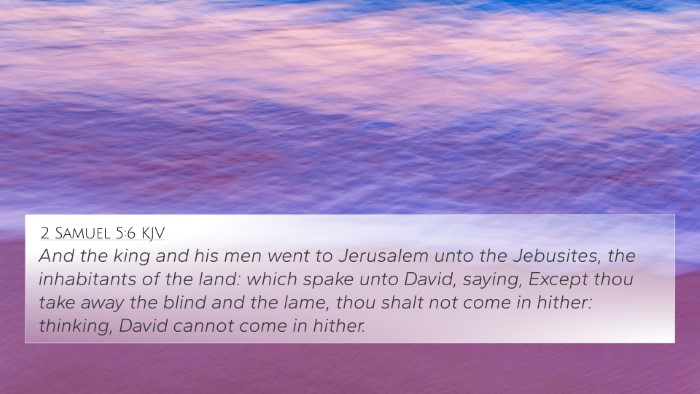Understanding Judges 19:10
Judges 19:10: "But the man would not stay that night; he rose up and departed, and came to a place over against Jebus, which is Jerusalem; and there were with him two asses saddled: his concubine also was with him."
This verse is part of a narrative that reveals themes of hospitality, violence, and societal breakdown, which resonate deeply throughout the Book of Judges. The decision of the man to depart instead of receiving hospitality highlights significant cultural and moral undercurrents prevalent in the Israelite society at the time.
Commentary Insights
Matthew Henry: Henry emphasizes the man's choice to leave Jebus (Jerusalem) as a critical moment. He notes that the man was 'not willing to stay,' suggesting that he was driven by a sense of urgency or distress. Henry points out that this decision leads to tragic consequences, marking a turning point in the biblical narrative wherein the societal norms of hospitality were disregarded.
Albert Barnes: Barnes reflects on the significance of Jerusalem, referred to as Jebus in this context. He indicates that despite its eventual importance as the site of the Temple and the capital of Israel, at this time, it was a city that had not yet been conquered by the Israelites. This geographic detail points to the broader implications of Israel's lack of unity and the problems arising from a failure to establish a central authority or sanctuary.
Adam Clarke: Clarke notes the dangers of traveling alone and the neglect of hospitality during those times. He indicates that the decision to refuse the comfort of companions and stay begins a troubling narrative filled with violence and immorality, reflecting the spiritual decline of Israel. Clarke urges readers to consider the importance of community support during times of peril.
Thematic Connections to Other Scriptures
The themes of this verse can be linked to various biblical passages that discuss hospitality, moral decline, and the consequences of decisions. Here are some relevant cross-references:
- Genesis 19:1-3: The hospitality shown by Lot to the angels in Sodom serves as a parallel to the lack thereof shown in this narrative.
- Matthew 10:14: Jesus discusses the implications of accepting or rejecting strangers, which echoes the themes of hospitality.
- Proverbs 27:10: "Better is a neighbor that is near than a brother far off," alluding to the importance of supportive relationships.
- Judges 19:22-30: The ensuing events following this verse highlight the grave consequences of the man's decision, culminating in violence.
- Philippians 2:4: Encouragement to consider others' interests above one's own speaks to the neglect of community seen here.
- Jeremiah 5:7: This verse reflects the unfaithfulness and moral decline of God’s people, drawing a parallel to the context of Judges.
- Luke 10:30-37: The Good Samaritan story emphasizes mercy and help to strangers, contrasting with the neglect seen in Judges 19.
Broader Insights on Cross-Referencing Bible Verses
Understanding Judges 19:10 in its context requires recognizing the connections between various biblical scriptures. The act of cross-referencing not only provides a more comprehensive understanding of the text but also unveils thematic resonances throughout the Bible.
Utilizing tools for Bible cross-referencing enhances the study of scripture. A Bible concordance can help identify thematic links and foster deeper interpretations. Such resources are invaluable for anyone engaging in a thorough Bible study or sermon preparation.
Conclusion
Judges 19:10 serves as a cautionary tale about the importance of understanding the narrative's cultural context, the significance of hospitality, and the moral decline evident within the text. The derived interpretations and cross-references enrich our understanding of the recurring themes of community, morality, and divine justice found throughout scriptural texts.








